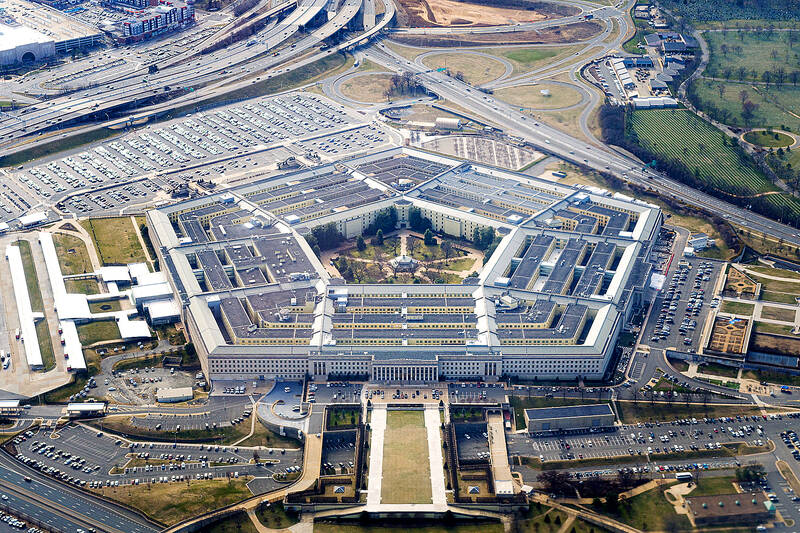The US Department of Defense added more Chinese companies, including drone maker DJI Technology Co (大疆創新) and surveillance equipment maker Zhejiang Dahua Technology Co (浙江大華科技), to a blacklist that subjects them to an investment ban for Americans.
BGI Genomics Co Ltd (華大基因), which has DNA-sequencing contracts with health firms and universities worldwide, and runs a massive gene databank, as well as CRRC Corp (中國中車), which engages in the manufacture and sale of rail transit equipment, are also among the 13 companies added to the list released by the Pentagon on Wednesday.
Last year, a Reuters review of scientific papers and company statements found that BGI developed its prenatal tests in collaboration with the Chinese military and was using them to collect genetic data for sweeping research on the traits of populations.

Photo: REUTERS
“The Department is determined to highlight and counter the People’s Republic of China’s [PRC] Military-Civil Fusion strategy, which supports the modernization goals of the [Chinese] People’s Liberation Army by ensuring its access to advanced technologies and expertise are acquired and developed by PRC companies, universities and research programs that appear to be civilian entities,” the Pentagon said in a statement.
The list bars buying or selling publicly traded securities in target companies.
An initial tranche of about 50 Chinese firms that included telecoms equipment maker Huawei Technologies Co (華為) was added to the US list in June last year.
At the time, US President Joe Biden signed an executive order that banned US entities from investing in the dozens of Chinese firms with alleged ties to defense or surveillance technology sectors.
The order aimed to prevent US investment from supporting the Chinese military-industrial complex, as well as military, intelligence and security research and development programs.
It was part of Biden’s broader series of steps to counter China, including reinforcing US alliances and pursuing large domestic investments to bolster US economic competitiveness, amid increasingly sour relations between the world’s two biggest economies.
Separately, sources have said that the Biden administration is planning to exclude SK Hynix Inc and Samsung Electronics Co from new restrictions on DRAM and flash memorychip makers in China.
The US Department of Commerce, which is scheduled to release new curbs on exports to China this week, will likely deny requests by US DRAM or flash memorychip equipment suppliers to send their products to Chinese firms including Yangtze Memory Technologies Co (YMTC, 長江存儲) and ChangXin Memory Technologies Inc (CXMT, 長鑫存儲), they said.
However, license requests to sell equipment to non-Chinese firms making advanced memory chips in the country would be reviewed on a case-by-case basis, they said.
“The goal is not to hurt non-indigenous companies,” one of the people briefed on the matter said.
The White House and the commerce department declined to comment.
SK Hynix, Samsung, YMTC and CXMT did not respond to requests for comment.
The Chinese embassy in the US on Thursday described the expected rules as “sci-tech hegemony.”
It said the US is using its “technological prowess ... to hobble and suppress the development of emerging markets and developing countries.”

A magnitude 7.0 earthquake struck off Yilan at 11:05pm yesterday, the Central Weather Administration (CWA) said. The epicenter was located at sea, about 32.3km east of Yilan County Hall, at a depth of 72.8km, CWA data showed There were no immediate reports of damage. The intensity of the quake, which gauges the actual effect of a seismic event, measured 4 in Yilan County area on Taiwan’s seven-tier intensity scale, the data showed. It measured 4 in other parts of eastern, northern and central Taiwan as well as Tainan, and 3 in Kaohsiung and Pingtung County, and 2 in Lienchiang and Penghu counties and 1

A car bomb killed a senior Russian general in southern Moscow yesterday morning, the latest high-profile army figure to be blown up in a blast that came just hours after Russian and Ukrainian delegates held separate talks in Miami on a plan to end the war. Kyiv has not commented on the incident, but Russian investigators said they were probing whether the blast was “linked” to “Ukrainian special forces.” The attack was similar to other assassinations of generals and pro-war figures that have either been claimed, or are widely believed to have been orchestrated, by Ukraine. Russian Lieutenant General Fanil Sarvarov, 56, head

FOREIGN INTERFERENCE: Beijing would likely intensify public opinion warfare in next year’s local elections to prevent Lai from getting re-elected, the ‘Yomiuri Shimbun’ said Internal documents from a Chinese artificial intelligence (AI) company indicated that China has been using the technology to intervene in foreign elections, including propaganda targeting Taiwan’s local elections next year and presidential elections in 2028, a Japanese newspaper reported yesterday. The Institute of National Security of Vanderbilt University obtained nearly 400 pages of documents from GoLaxy, a company with ties to the Chinese government, and found evidence that it had apparently deployed sophisticated, AI-driven propaganda campaigns in Hong Kong and Taiwan to shape public opinion, the Yomiuri Shimbun reported. GoLaxy provides insights, situation analysis and public opinion-shaping technology by conducting network surveillance

‘POLITICAL GAME’: DPP lawmakers said the motion would not meet the legislative threshold needed, and accused the KMT and the TPP of trivializing the Constitution The Legislative Yuan yesterday approved a motion to initiate impeachment proceedings against President William Lai (賴清德), saying he had undermined Taiwan’s constitutional order and democracy. The motion was approved 61-50 by lawmakers from the main opposition Chinese Nationalist Party (KMT) and the smaller Taiwan People’s Party (TPP), who together hold a legislative majority. Under the motion, a roll call vote for impeachment would be held on May 19 next year, after various hearings are held and Lai is given the chance to defend himself. The move came after Lai on Monday last week did not promulgate an amendment passed by the legislature that